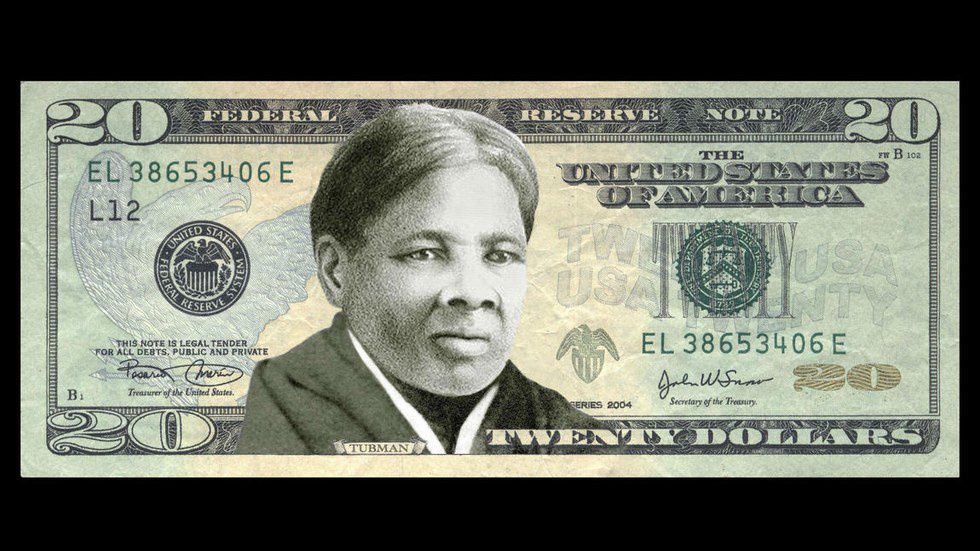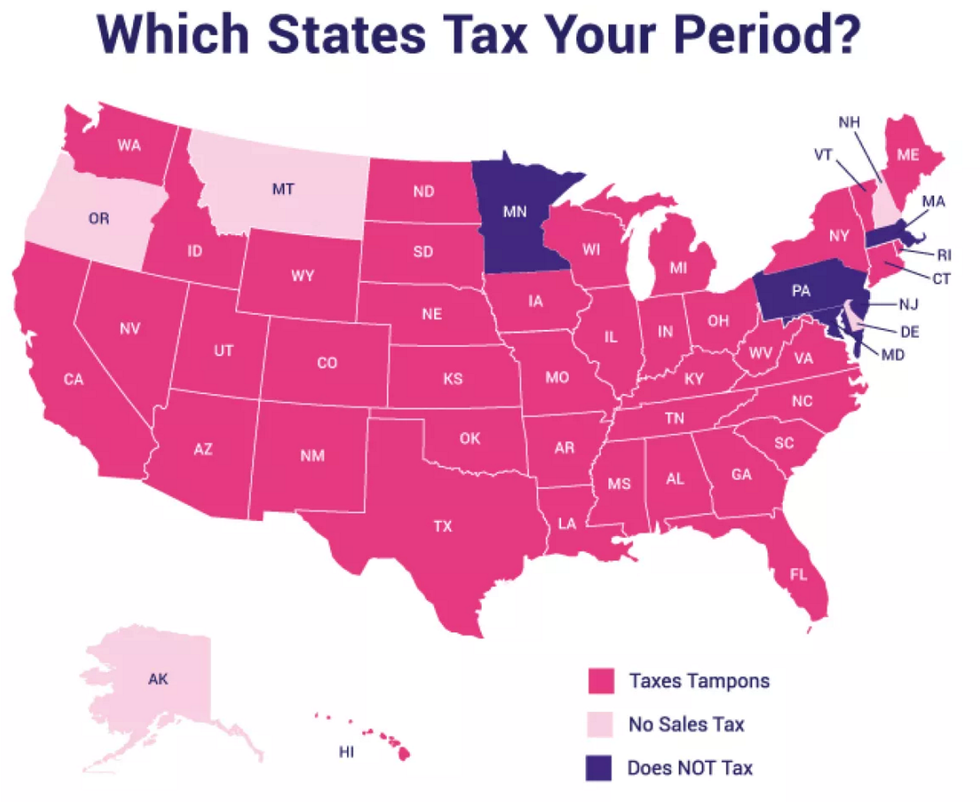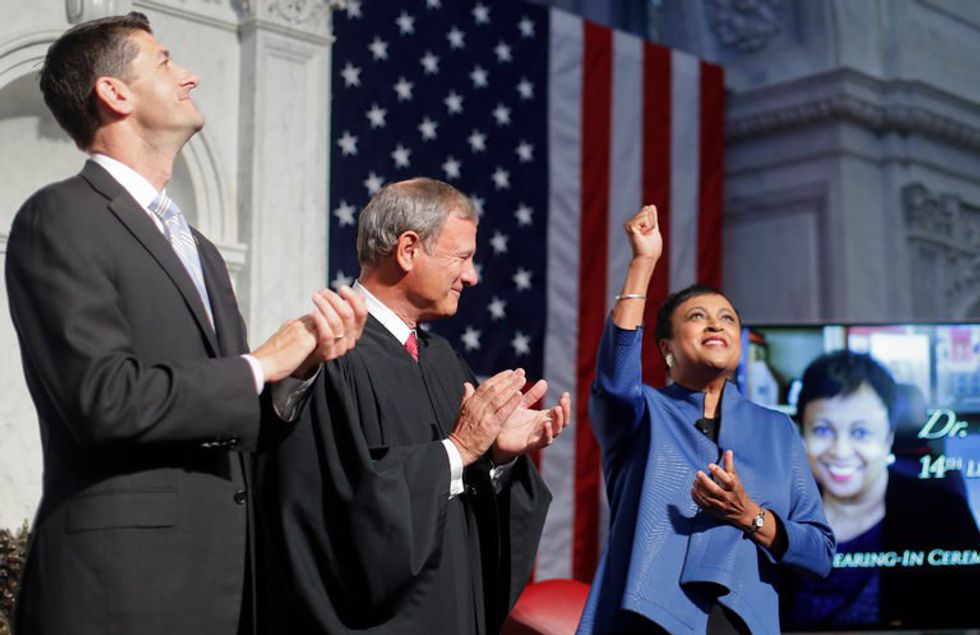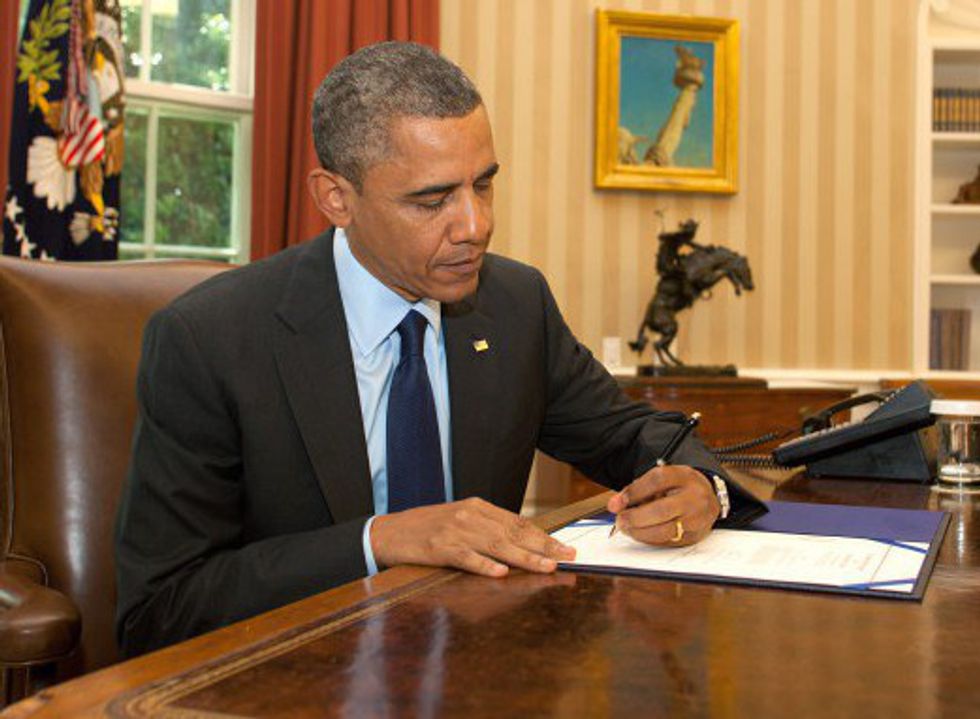As a year marked by death, debate, and disillusionment culminates in an unprecedentedly polarized social environment, Americans can agree to one thing: 2016 was nobody’s year. Patron Saint Clinton lost a highly contentious election and we lost Prince; 971 people died at the hands of police and Harambe died at the hands of the Cincinnati Zoo; the Indians fell to the Cubs and the Standing Rock Sioux almost fell to the feds. It was a rough twelve months.
I am neither a self-declared optimist nor am I one to see the glass half-full. On the contrary, I generally see it as an excuse to pour another drink. This year provoked many of us to question the worth of our womanhood, something from which no amount of shots could ever numb us. However, while we were busy lamenting our dismal positions in society, other badass women were out paving the way for all of us. 2016 was a lesson in girl power. Let’s raise a glass to that.
1. January 28: The U.S. Military doubled the time of paid maternity leave for new and expecting mothers.
Because a woman’s place is in the home of the brave, Ash Carter, the country’s Secretary of Defense (pictured), formally announced that the Department of Defense would double paid military maternity leave, expanding the amount of time for new army mothers to bond with their babies from six to twelve weeks after giving birth. Although a cut for mothers in the Navy and Marine, who had been granted 18 weeks since July, 2015, women who were currently pregnant or became pregnant within 30 days of the policy’s enactment would still be allowed the extended period. The decision applies to all service members in the active duty component and to reserve-component members serving in a full-time status or on definite active duty recall or mobilization orders in excess of 12 months.
To quote the Secretary, “Our calculation is quite simple – we want our people to be able to balance two of the most solemn commitments they can ever make: a commitment to serve their country and a commitment to start and support a family.”
Carter added that he was requiring that mothers’ rooms be available in every Department facility with upwards of fifty women in efforts to support new mothers upon their returns to work. To accommodate military families, the Department is seeking legislation to expand military paternity leave from 10 to 14 days of non-continuous leave benefit and increasing force-wide child care access to fourteen hours of the day.
2. March 1: Texas A&M University announced that women are to serve simultaneously in the campus’s three top student leadership positions.
When Texas A&M University, or TAMU, opened in 1876, it had been established as a military land-grant college for white men. It took nearly a century for an African-American or a woman to enroll as an Aggie; it wasn’t until 1963 that both the university’s first black student enrolled nearly a decade after the Supreme Court outlawed segregation in public schools and women were first accepted on a “limited basis.” Hence, when three women procured the three top student leadership positions on campus this year, they shattered any notions that the College Station campus was a male-dominated institution.
Hannah Wimberly (pictured left), a then-junior study human resource and development, was elected the university’s 2016-2017 student body president. She went on the record as saying that her campaign as never about her gender. Her twin sister, Claire (pictured right), was also elected president of the Class of 2017.
On the other hand, Cecille Sorio (pictured center) was selected was the next commander of the Corps of Cadets, a student military organization and the oldest student organization on the College Station campus. (Any self-respecting female heralding from south of the Mason Dixon knows the Cadets’ riding boots are more precious than any pair of Louboutins could ever be). Sorio is only the second female Corps commander, following in the footsteps of then-commander Alyssa Michalke, who was the first.
As the Aggies say: thanks and gig ‘em… and girl power.
3. March 20: The first domestic violence shelter in Saudi Arabia opened, receiving 1,890 calls in its first three days of business.
By no means is Saudi Arabia the most pro-woman nation; in fact, the country still operates under the male guardianship system, in which women remain under the power of their male guardians (be they fathers or husbands) for the entirety of their lives and cannot travel, work, or do anything powerful with their lives without a man’s explicit consent. As in any country with such pervasive gender inequality, Saudi Arabian women have little power to speak out following incidents of domestic or sexual violence.
The Center for Domestic Violence, the first center in Saudi Arabia with the explicit objective of providing resources to victims of such, was launched by Social Affairs Minister, Majed Al-Qassadi, and takes calls related to domestic violence and other incidents of abuse 24/7, seven days a week. Abdullah Almeiqil, the undersecretary for social welfare, revealed that the Center received 1,890 calls over the course of the first three days in which it was open, receiving 916 (or 49%) new cases.
Additionally, the Ministry of Social Affairs is drafting a set of regulations and preventive procedures to most effectively limit cases of domestic violence, including an executive list for protections against abuse and child protection. Try messing with a Saudi woman now.
(Pictured is a 2013 image from the country's first public campaign ad against domestic violence).
4. April 8: California legislation went into effect allowing pharmacists to prescribe contraceptive.
When legislation passed in 2013 enabling pharmacists in California to prescribe hormonal contraception – including pills and patches – went into effect nearly three years later this past April, California became the third state (including Oregon and Washington, pictured) to make birth control accessible to women without prescriptions. The measure is aimed at increasing access to birth control and reducing the frequency of unintended pregnancies, which account of half of American pregnancies. Although the law does not mandate that each of California’s 6,500 pharmacies participate, it allows women to circumvent the regular process of scheduling and paying for an appointment with a gynecologist to get an annual prescription for birth control.
Many pharmacies have complained that the one-hour training mandated for each staff member to prescribe birth control and the additional time they will spend taking a patient’s blood pressure, administering a health history questionnaire, and reviewing possible side effects will be a burden on their staff. Although contraception is covered by insurance plans under the Affordable Care Act, a number of pharmacists charge an additional fee for the aforementioned consultation time with interested women (one woman, who went to Vons in Redlands, CA, reported paying forty-five dollars for this service). However, this is just a small price to pay for reclaiming our reproductive rights when 93% of Americans live within five miles of a pharmacy and gynecological appointments pose challenges for many women due to finding a reputable doctor, taking time off of work for an appointment, and covering the cost of the visit.
 5. April 20: The U.S. Treasury announced that Harriet Tubman was to replace Andrew Jackson on the $20 bill.
5. April 20: The U.S. Treasury announced that Harriet Tubman was to replace Andrew Jackson on the $20 bill.
In a twist better than any conjured up by M. Night Shyamalan, Jacob J. Lew, Treasury Secretary, announced that the famed female abolitionist was to replace the slaveholding president responsible for the Trail of Tears. The change was announced as part of a historic overhaul of American currency aimed at addressing America’s legacy of slavery and gender inequality. While no contemporary action can ever make up for the injustices perpetuated by a tradition of slavery, this modernization seems to be a step in the right direction.
Although women have been more commonly featured on American coins (think the Susan B. Anthony or Sacagawea dollar coins and Helen Keller’s guest feature on an Alabama special-issue quarter), Tubman is only the third woman to appear on paper currency. (Pictured is a 2015 proposal by the Women on 20s organization). Martha Washington, George’s widely-loved wife, appeared on a $1 silver certificate issued in 1886 and discontinued by the twentieth century. Two decades earlier, Pocahontas appeared on the backside of a $20 bill.
6. June: Three states (Connecticut, Illinois, and New York) passed legislation outlawing tampon taxes.
Of all of the products and services available to consumers throughout the United States, feminine hygiene products are amongst the most necessary. However, they are not amongst the multitude of products and services which may be purchased tax-free throughout the United States, including bagged salads in Colorado, season croutons in Texas, mani/pedis in West Virginia, and tickets to rodeos in South Dakota. In fact, forty states tax anywhere from 4 to 10% on menstrual products.
However, between June and August, 2016, officials in Connecticut, Illinois, and New York all passed measures to end increasingly unpopular sales taxes on feminine hygiene products including tampons, pads, and menstrual cups (pictured). Although no formal “tampon tax” exists, the majority of states treat menstrual products as luxury goods not exempt from state sales taxes, as opposed to medical necessities (including Viagra, because not being able to 'get it up' is worse than not being able to move without standing in a puddle of blood and other bodily fluids). Estimates indicate that New York consumers will save upwards of $10 million annually by eliminated the tax, which generations approximately $20 million a year in California state revenue.
The historic legislation was passed in New York just a week after Bill de Blasio, Mayor of New York City, signed a law ensuring the availability of free tampons and pads in all public schools, homeless shelters, and jails across the city. Next time a bright-eyed high school student gives a report on Japan, the only red dot her classmates will be seeing will be on her PowerPoint and not on her whitewashed Paige denim.
7. July 7: Germany passed a “No Means No” law defining rape as a violation of a woman’s will without consent.
Shockingly enough, the American legal system – amongst those of other Western countries – has been proven to be one of the pioneers of consent-driven sexual assault legislation. Consider Germany, the only Western European country that lacks clear legislation against groping. The country boasts one of Europe’s worst records for protecting women from sexual violence and failed to criminalize marital rape until 1997. International women’s rights groups have long protested Germany’s lack of effective legislation protecting women against sexual violence and the strict requirements for filing criminal complains that have, consequently, curtailed reports and prosecutions of such incidents.
At the cost of dozens of women assaulted in plain sight on New Year’s Eve, 2015, in Cologne, whose abusers could not be prosecuted in court due to lack of evidence, this trend is being reversed. 601 lawmakers resent in Germany’s lower Parliamentary house voted unanimously to in favor of legislation making it easier to prosecute suspects of sexual violence and defines rape as the violation of a victim’s will under the principle of “no means no.” The law includes language that considers situations in which men take advantage of crowded situations to initiate inappropriate contact, a provision added following the surplus of Cologne attacks.
(Pictured are demonstrators at a protest in Berlin on June 27).
8. July 21: Hillary Clinton became the first female presidential nominee for a major political party.
Nearly a century after American women were granted the right to vote, a major political party finally named the first female presidential candidate: following a failed campaign eight years previous, Hillary Clinton was named the Democratic National Convention’s presidential nominee (pictured). On July 19, Clinton thanked delegates for helping her put “the biggest crack in that glass ceiling yet.”
Many women in the electorate had waited a lifetime to see the first viable female contender for the United State’s highest elected office. The moment came nearly 168 years after the Seneca Falls Convention; 150 years about Anthony and Elizabeth Cady Stanton founded the first organization dedicated to suffrage for women of all races; and 166 years after Susan B. Anthony’s conviction for voting in the 1872 presidential election. When the cheers, balloons, and fireworks rocketed into the rafters of Philadelphia’s Wells Fargo Center, it was not only Clinton celebrating her nomination, but generations of women who had faced oppression in both the workplace and their private lives.
9. August 9: The U.S. Women’s Gymnastics team, the “Final Five,” took home the team gold at the Rio Olympics.
The U.S. women’s team has long been a dominant roster in the gymnastics world. Although individual team members have historically captured both individual gold medals and international attention (think of Dominique Dawes, Nastia Liukin, Shannon Miller, Carly Patterson, and Mary Lou Retton), the American national team rose to record-breaking prominence at the 2016 Summer Olympic Games in Rio de Janeiro.
The “Final Five,” named in honor of famed national team coordinator Martha Karolyi’s final competition season before her retirement, included commanding team members Simone Biles, Gabby Douglas, Laurie Hernandez, Madison Kocian, and Aly Raisman (pictured). After two days of women’s team all-around competition, including rotations through four different apparatuses, the Final Five scored 184.897 to easily clinch gold. Their victory was uncontested, as nearly eight points separated America’s star-spangled athletes from second-place Russia – more than double the gap between silver and last place.
Karolyi’s concluding team was not the first American women’s gymnastics squad to win gold, though; the “Magnificent Seven” first achieved such at the 1996 Games and the “First Five” did so in 2012. Even as the continuation of a tradition of global prominence, the Final Five stands out; the United States women’s gymnastics team has won all five world or Olympic titles since 2011. Their margin of victory is the biggest since at least 1976, as no country has won five consecutive team titles at major international competitions since 1976. Of the eighty-eight world championship and Olympic medals the team has earned since 2001, thirty-four have come since team America’s dominance began in 2011.
Moreover, for the second consecutive Summer Olympic Games, American women out-earned the American men in the total medal count. The full United States medal count totaled 121 in Rio, solidifying America was the winningest participating nation in the 2016 Games, but sixty-one came from women, fifty-five from men, and five in mixed events (including equestrian and mixed-doubles tennis). Of the twenty-seven golds with which the United States team returned, twenty-seven came from women. If the United States were divided into gender-exclusive teams, the women’s roster would time them with Britain for the most gold medals won by any country, one gold medal ahead of China, and far ahead of the American men.
Although this trend became apparent long before it came to fruition at the 2012 Summer Olympic Games in London, American women were not always such a powerhouse. At the 1972 Olympics in Munich, American women won twenty-three medals compared to the seventy-one earned by American men. The women did not win a single medal in gymnastics and returned without golds in track and field. The same year, though, U.S. Congress passed Title IX, legislation barring sex discrimination in education programs that received federal funding. The law revolutionized women’s sports at both the secondary and collegiate levels.
Who said women couldn’t do everything – and more – that men could?
10. August 29: Carnegie Mellon University announced, for the first time in the school’s history history, that women constituted half of its computer science major.
Science, technology, engineering, and mathematics (STEM) courses have long been reserved for men. Glass ceilings have effectively restricted women’s access to a diverse scientific community built upon discovery and innovation. Discouragingly enough, statistics indicate that every 5 out of 6 students in a typical computer science program classroom will be male. In fact, Carnegie Mellon University, a private research university in Pittsburgh, Pennsylvania, known for its world-renowned robotics and drama programs and pioneering one of the country’s first computer science departments (pictured), did not merge with its coordinate women’s college until 1973.
This year, though, women in STEM fields reached an important milestone. For the first time in history, Carnegie Mellon’s prestigious computer science major achieved near gender parity, with 48.5% of its 2016-2017 class being female. The program also reported a 38% rise in the number of women who applied to the department, indicating that women have been consistently encouraged to pursue opportunities in the correlating fields. This is indicative of the many advances women are making in STEM programs at prominent institutions nationwide, which is not only a moral obligation, but a practical application.
Turns out we can do more than simply shop online.
11. September 14: Carla Hayden was sworn in as the first woman and African-American Librarian of Congress.
In 1740, legislation passed in South Carolina imposed penalties on African-Americans for attempting to learn how to read and write. It went as far as to threaten educators with hefty fines for their involvement.
In 1819, the Virginia Revised Code passed similar a similar law outlawing African-American literacy.
In 2016, nearly 200 years later, African-American woman Carla Hayden was sworn in as the fourteenth Librarian of Congress (pictured). She was the first person to hold the position who was not a white man. At her swearing-in, Hayden said, “As a descendant of people who were denied the the right to read to now have the opportunity to serve and lead the institution that is the national symbol of knowledge is a historic moment.” Young, African-American girls learning to read and write will one day read about Hayden in their history textbooks.
The Librarian of Congress is responsible for managing its expansive collections of books, documents, and music. Hayden will handle research for the legislative branch, deal with copyright policies, and navigate the mysterious Cloud. Beyond telling library visitors to stay silent, Hayden will be shutting up any disbelievers who have doubted that this position is a man-only gig.
12. October 3: Widespread protests brought international attention to Polish legislation threatening to ban abortions.
After the conservative organization Ordo Luris proposed an abortion law that would effectively outlaw abortion except in the cases of rape, incest, or threats to either the mother or fetus’s life, and make abortion punishable by up to five years in prison, women across the country fought back. An estimated six million women boycotted work and showed up to protests across the country, with 30,000 women marching through Warsaw alone. Without half of their workforce, government offices, universities, and schools across Poland shut down for “Black Monday,” dubbed so because women donned black clothing as a symbol of mourning for the [few] reproductive rights they risked losing (pictured).
The mass demonstrations came as a pleasant surprise, since the government of the predominantly Catholic country boasts the support of the Church. Fittingly enough, one group of protesters blocked entrances to the central government offices in Warsaw and chanted, “We want doctors, not missionaries!” Others held posters emblazoned with the message, “A government is not like a pregnancy – it can be terminated.”
As a result of the movement, politicians have eased away from the idea. It seems as if the legislators who have called themselves pro-life are now being silenced by millions of women making their voices heard loud and clear.
13. October 6: Pakistan passed legislation outlawing and toughening the penalty for “honor” killings.
This year, Pakistani lawmakers took the first major step in countering the country’s increasing rate of “honor” killings, bolstering the penalties and closing a loophole allowing killers to go free. Honor killings are rooted in traditions by which a family’s honor is bound up with a woman’s chastity. In 2015 alone, more than 1,000 women were killed by their fathers, brothers, or husbands for marrying the man of their choices, or even meeting or being seen sitting with a man. The killings have long been met with acceptance, and even approval, but neighbors and relatives. (Pictured are protesters condemning the murders).
In accordance with Islamic Shariah law, Pakistan’s legal code since the 1990s, victims’ families have traditionally been allowed to forgive the murderer. Since the culprits are usually close relatives, they are almost always forgiven and walk free of any consequences for their homicides. The new measure, however, imposes a mandatory twenty-five-year prison sentence for those convicted of honor killings and bans family members from forgiving them, except in the case of the death penalty, in which case the sentence is commuted to prison time.
Conservatives and religious extremists have voiced opposition to the law, calling it indicative of the country’s forced Westernization. However, women’s rights are universal rights, something which many international legislators finally seem to realize.
14. October 7: President Obama signed the Sexual Assault Survivors’ Rights Act into law.
With a historic stroke of his presidential pen (pictured), Obama signed into law the Sexual Assault Survivors’ Rights Act, or Survivors’ Bill of Rights Act of 2016, the first piece of legislation to guarantee federal rights to victims of sexual violence. Under the new law, survivors are guaranteed access to their rape kits, for which they are no longer responsible for paying, and states are required to preserve the kits for the entire applicable statute of limitations. Furthermore, states are now expected to notify victims sixty days before their kit is scheduled to be destroyed.
Prior to the Act’s enactment, states disposed of untested rape kits after six months unless survivors filed for an extension, a particularly burdensome responsibility to place upon a victim of a crime while police search for a culprit. In states including Massachusetts, where Amanda Nguyen was assaulted in 2013, the disposal of the kit prevents victims from pressing charges later on. Other states, like Florida, went about this process in as short as thirty days after an assault.
The bill passed unanimously in both the Senate and the House of Representatives after it was introduced by Senator Jeanne Shaheen (D-NH), who sponsored the legislation after meeting with Nguyen. Shaheen commented, “Beginning today, our nation’s laws stand firmly on the side of survivors of sexual assault.”
15. November 8: Six women made history on Election Night, including Ilhan Omar.
Even when Patron Saint Clinton lost the highly contentious battle to become the first female President of the United States, six other women made history in the 2016 election. Amongst the women elected to the Senate were Tammy Duckworth, Kamala Harris, and Catherine Cortez Masto; Pramila Jayapal and Stephanie Murphy were elected to the House of Representatives; and Ilhan Omar was voted into the Minnesota state legislature. Each are both outstanding examples of resilience, leadership, and drive and true testaments to womanhood in the twenty-first century.
Duckworth (D-IL) is the first Asian American woman elected to Congress in Illinois, the first disabled woman to be elected to the House of Representatives, and the first member of Congress born in Thailand. An Iraq War veteran, Duckworth was the first female double amputee from the war (she lost both of her legs in 2004 when the UH-60 Black Hawk helicopter she was co-piloting was hit by a rocket-propelled grenade fired by Iraqi insurgents). No one before her has proven that he or she did not need two legs to stand firmly on two feet.
Harris (D-CA), the state’s former attorney general, has already solicited comparisons to Barack Obama, who famously ran a successful presidential campaign for during his first term in the Senate. Both her background (Harris is only the second black woman and the first Indian-American ever elected to Senate) and polished political approach embody the direction towards which many democrats hope the party is moving. Prior to her Senate win, her name had been suggested for positions including California governor, Supreme Court justice, and vice president.
Masto (D-NV) is both the first woman elected to represent Nevada and the first Latina Senator.
Jayapal (D-WA) will be the first Indian-American woman to serve in the House of Representatives and the first woman to represent Washington’s Seventh District. The politician was born in Chennai, India, to a Tamil family and raised in Indonesia and Singapore before immigrating to the United States in 1982. Jayapal boasts a progressive pro-immigrant record, having first founded Hate Free Zone after 9/11 as an advocacy group for immigrant groups. Before the group changed its name to OneAmerica in 2008, it successful sued the Bush administration’s Immigrant and Naturalization Services, preventing the deportation of upwards of 4,000 Somalis across the country. If Trump pursues mass deportations, as he promised during his campaign, Jayapal poses a major threat to his injustices.
Murphy (D-FL), Ho Chi Minh City-born politician, defeated incumbent John Mica with 51% of the vote to become the first Vietnamese-American woman elected to Congress.
After beating Democratic twenty-two term incumbent in the primary, Omar successfully won House District 60B in southeast Minneapolis with 80% of the vote to become the first Somali-American lawmaker in the United States (pictured celebrating her triumph in the primary). The former refugee, Muslim, and mother of three originally came to the United States in 1995, the youngest of seven children, after fleeing the Somali civil war and spending four years in a Kenyan refugee camp. Although she knew no English then, she is fluent in both business administration and politics now.
Each of these women exemplify the cracks in both the glass ceiling and borders that disenfranchise women and minority groups from having their voices heard in America. Their victories are universal triumphs and visible steps towards truly achieving “justice for all.” These are the women to whom we should look up.
16. November 9: Kellyanne Conway became the first woman to run a victorious presidential campaign.
Back in August, Kellyanne Conway was promoted from Donald Trump’s senior adviser and pollster to his third campaign manager (pictured with her boss). She then became the first woman to ever run the campaign of a GOP presidential nominee (three democratic campaign managers preceded her, but their candidates were all defeated). At the time, Trump was trailing Clinton by nearly 10% in various opinion polls.
Fast-forward to November, and the mom to four young children became the first woman to run a victorious presidential campaign. On Breitbart News Saturday on SiriusXM Patriot Radio Channel 125, Conway to said to co-host Sonnie Johnson, “I know Hillary Clinton failed to break the glass ceiling, but that I did in being the first female presidential campaign manager that was successful.”
While it might not have been the glass ceiling that women wanted to break, it was damn sure a broken window. Props to a good-looking blonde – and former pageant queen – for reminding everyone why women make all the plans.






 5. April 20: The U.S. Treasury announced that Harriet Tubman was to replace Andrew Jackson on the $20 bill.
5. April 20: The U.S. Treasury announced that Harriet Tubman was to replace Andrew Jackson on the $20 bill.



























